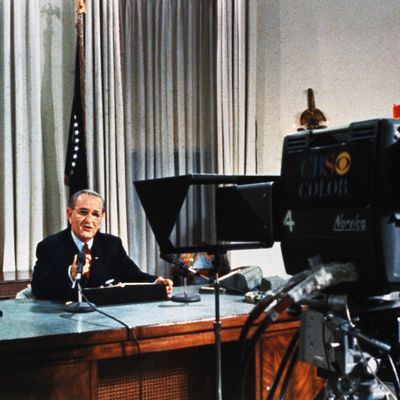
There is a misconception about how the 2024 presidential election is likely to unfold that just won’t die: that President Joe Biden will suddenly rethink his 2024 election bid and drop out. Independent candidate Cornel West was the latest to float this idea.
“I’m not even sure whether I’ll be running against Biden,” West told Politico. “Biden — I think he’s going to have an LBJ moment [and] pull back.”
This is an allusion to Johnson’s famous announcement on March 31, 1968, in conjunction with a Vietnam bombing halt, that he was ending his campaign for reelection. The idea is that, like LBJ, Biden will come to a realization, even after the 2024 primaries have begun, that it would be good for his party and country if he hung up his spurs and let Democrats choose someone who polls better against Donald Trump (or in LBJ’s case, against Richard Nixon).
In an earlier column I challenged the LBJ Redux scenario from the point of view of the two presidents’ political standing. In 1968, Johnson was leading a Democratic party deeply divided by the Vietnam War, which he had prosecuted relentlessly. He had already stumbled in a New Hampshire primary (not losing, but underperforming expectations badly) against Senator Gene McCarthy, and the more formidable Senator Robert F. Kennedy had just announced his own candidacy.
Biden is facing only feeble opposition from woo-woo author and failed 2020 candidate Marianne Williamson and obscure Minnesota congressman Dean Phillips; Biden currently leads the second-place Williamson by 60 points in the RealClearPolitics polling averages. His rivals are betting everything on making a splash in a rogue New Hampshire primary where Biden won’t even be on the ballot (though a write-in effort will be waged on his behalf). But Biden is almost certain to crush them there and in the official first primary of South Carolina on February 3. (South Carolina was Biden’s big breakthrough state in 2020.)
But beyond Biden’s stronger intra-party position, there are growing obstacles to the selection of a different nominee that Democrats simply did not face in 1968. Back then, only 13 states held primaries, and some of those were either nonbinding on delegates or were won by “favorite sons.” The ultimate nominee, Johnson’s veep Hubert Humphrey, did not enter a single primary.
In 2024, every delegate who will vote on the first ballot of the Democratic convention in Chicago will be pledged to a candidate according to the primary results. (So-called superdelegates who have seats at the convention through the elected or party offices they occupy won’t have any role unless there’s a first-ballot deadlock, which hasn’t happened since 1952.) There won’t be any large reserve of uncommitted votes a late-emerging candidate can comandeer (as Humphrey did in 1968). And thanks to generations of “front-loading” the primaries, the deal will go down much earlier on the calendar than in 1968. An estimated 48 percent of pledged Democratic delegates will have been chosen by March 12 (the week after Super Tuesday, when 15 states hold primaries). Filing deadlines have already passed or are fast approaching for these crucial primaries (Florida’s was on November 30, Michigan’s was on December 8, and the largest state’s, California’s, was on December 15).
So if the idea is for Biden to have a dark night of the soul and withdraw after the first few contests, it’s unclear how Democrats will settle on the ultimate nominee. Will there be enough primaries left for an open competition among the various would-be candidates we keep hearing about (e.g. Governors Gretchen Whitmer, Gavin Newsom, J.B. Pritzker, and Josh Shapiro, not to mention Vice-President Kamala Harris)? Or if people are expecting some sort of mind-meld among Democratic elites that produces an ideal Democratic ticket, how, mechanically, is that supposed to happen in a nomination system designed to make that choice via delegates pledged in primaries?
I’m not arguing that it would be impossible for Biden to step aside and for someone else to win the nomination; far-fetched scenarios for doing just that should be in the back of the mind for wire-pullers in both parties in case a health emergency or something else dramatic afflicts the current front-runners. But the breezy assumption that Democrats are stupidly blundering ahead when an alternative course is still available to them is just significantly out of date. The time for Joe Biden to take a pass and let his party go elsewhere for a 2024 nominee was months — arguably many months — ago. Second thoughts now would just create chaos.
More on politics
- Can Donald Trump Pardon Rudy Giuliani?
- Giuliani Held in Contempt for Second Time This Week
- Congress Doesn’t Reflect America’s Religious Profile






























